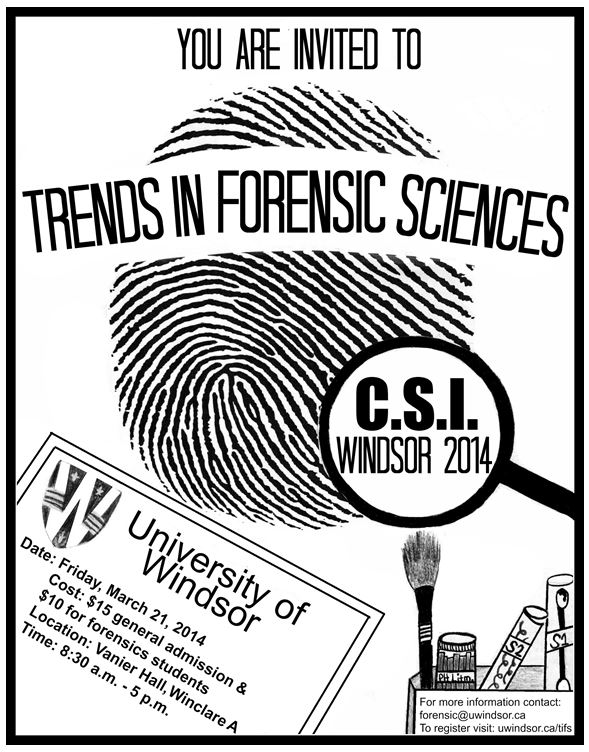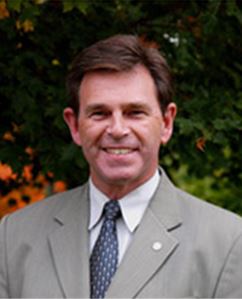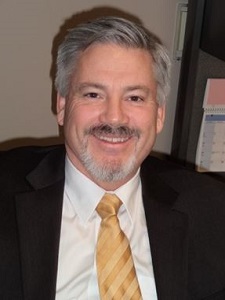
Trends in Forensic Science Conference poster 2014.
Keynote Speakers

Wade Knaap
Instructor – University of Windsor Forensic Sciences Program
Wade Knaap is a stipend instructor in the forensic science program at The University of Windsor, teaching Applied Methods of Forensic Identification. He is also a part-time faculty instructor (Lecturer) at The University of Toronto Mississauga, teaching forensic identification courses in the Forensic Sciences Program. He is a retired Forensic Identification Specialist with the Toronto Police Service and was the training coordinator within the Forensic Identification Services unit. In addition, Wade is a past president of The Canadian Identification Society and the former chair of the Ontario Police College Forensic Advisory Board. Wade has been published numerous times in both the Journal of Forensic Identification and Identification Canada regarding forensic identification concepts, and was a contributing author in the text Crime and Measurement: Methods in Forensic Investigation. In 2002-2003 he was the recipient of the Al Waxman Award for Excellence in Forensic Identification and was honoured as Distinguished Member of the International Association for Identification (IAI) in 2010. Wade is the current editor of Identification Canada.
Forensic Evidence – Myth vs. Reality
Forensic evidence is increasingly considered a prerequisite for obtaining a conviction during a criminal trial. Influenced by television shows and other media, the court often has a misunderstanding of the limitations that forensic evidence can provide. Preconceived notions of what can or cannot be done in the processing of a scene can impact how forensic investigators are perceived by jurors as well as how much evidentiary weight is placed on that which is discovered. “State of the Art” equipment and processing techniques combined with specialized chemistry are demonstrated on CSI shows and can incorrectly suggest to the viewer that fingerprint, DNA and other types of trace evidence is always there. “What is portrayed on television must be accurate, so why are your results not equally as good?” Wade Knaap will discuss the myth vs. reality and present an overview of forensic identification and how it relates to a criminal investigation.
Brian Manarin
Assistant Crown Attorney – Ontario Ministry of the Attorney General
Brian Manarin is an Assistant Crown Attorney employed by the Ontario Ministry of the Attorney General and has been practicing criminal law for over 25 years. He is possessed of B.A. and LL.B. degrees from the University of Windsor and an LL.M. degree from the University of London. Mr. Manarin has fostered a strong relationship with legal education, having lectured at the Bar Admission Course of the Law Society of Upper Canada from 1993 until 2005. Since 2002 he has been a sessional instructor at the University of Windsor, teaching courses that pertain to forensic science and matters criminal. His primary interests focus on the areas of expert testimony, mental health and comparative law. Mr. Manarin has published widely in various journals including: The Criminal Law Quarterly, Medicine, Science and the Law, The Windsor Review of Legal and Social Issues, The American Journal of Trial Advocacy, and the Tulane Journal of International and Comparative Law.
Ethicality and the Expert Witness
The test for the introduction of expert testimony at trial was settled by the Supreme Court of Canada in 1994 when it rendered its judgment in the case of The Queen v. Mohan. However, assuming that counsel satisfies the court that the Mohan admissibility criteria have been met, what then is expected of the expert who must now testify under oath or solemn affirmation? Although telling the truth appears, at least intuitively, to be a simple concept to grasp, the evidence of an expert witness is often criticized not so much for what was said, but rather for what was not brought to the attention of the court. Failure to proactively “tell the whole truth” can, and arguably should, detrimentally affect the weight that is afforded the expert’s testimony. Indeed, failure to be forthcoming with relevant insights may brand the expert with the scarlet letter of incredulity, the ramifications of which will not only damage the individual witness’s reputation, but also that of the particular field of expert endeavour that he or she is representing.
2014 Sponsors
Trends in Forensic Sciences: CSI Windsor 2014 gratefully acknowledges the support of the following sponsors:
- Alumni Association, University of Windsor
- Bookstore, University of Windsor
- Inter-Faculty Society, University of Windsor
- Office of the Provost & Vice-President, Academic, University of Windsor
- Office of the Vice-President, Research & Innovation
- Student & International Affairs (Student Life Enhancement Fund), University of Windsor
- University of Windsor Students' Alliance (UWSA)
External Sponsors:
- CRC Press, Taylor & Francis Group
- Devonshire Mall
- Dr. Disc
- From the Heart Gift Shop
- Full Circle Vintage Clothing
- International Relations Committee, City of Windsor
- KELCOM
- Terra Cotta Pizza
- White Feather Holistic Arts



